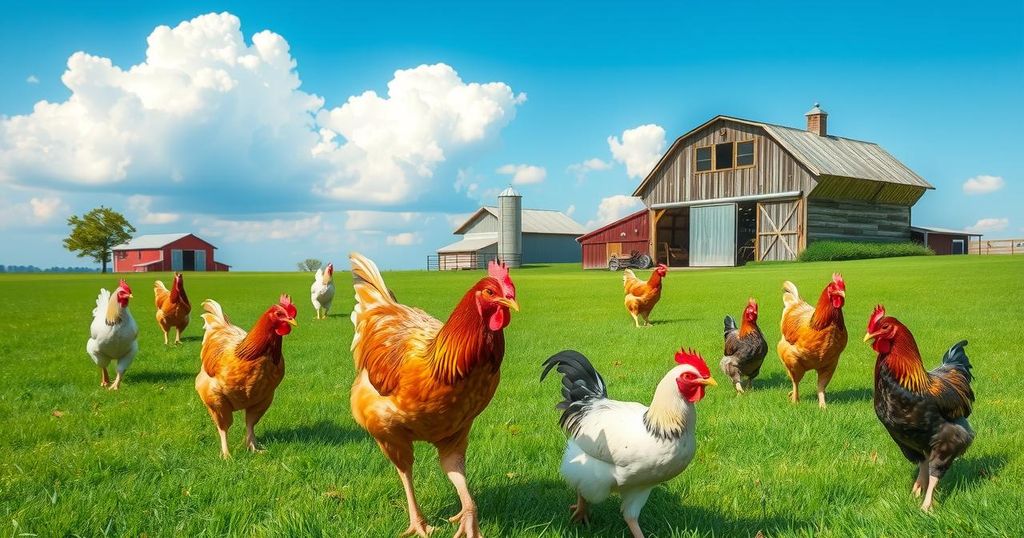Politics
AGRICULTURE, ASHLEY PETERSON, BRAZIL, BRAZILIAN ANIMAL PROTEIN ASSOCIATION, DONALD TRUMP, DUSTY JOHNSON, FOOD INDUSTRY, FOOD INSECURITY, FOOD SAFETY, INFLATION, LEAH DOUGLAS, NATIONAL CHICKEN COUNCIL, REUTERS, SOUTH AMERICA, SOUTH DAKOTA, TOM POLANSEK, TRUMP, U. S, U. S. FOOD AND DRUG ADMINISTRATION, US
Dante Raeburn
U.S. Increases Brazilian Egg Imports Amid Bird Flu Crisis
The U.S. has raised imports of Brazilian eggs and is considering regulatory changes to utilize broiler chicken eggs amidst an egg shortage caused by bird flu. This situation has led to inflated prices and supply challenges, prompting states to pause welfare policies to stabilize the market. Safety concerns arise over the handling of these eggs, yet measures are aimed at fulfilling the rising demand without compromising food safety.
The United States has significantly increased its imports of Brazilian eggs, which were previously designated solely for pet food, in response to escalating egg prices caused by a bird flu outbreak. The administration is also contemplating deregulation to allow eggs from broiler chickens, aiming to alleviate the egg shortage without affecting fresh egg availability in grocery stores. However, some food safety experts caution that this move could introduce contamination risks from harmful bacteria.
The ongoing economic strain from the avian flu, which has decimated approximately 170 million birds since early 2022, has resulted in notable food inflation. With grocery shelves experiencing shortages and an increase in restaurant prices, the wholesale price of eggs surged by over 53% in February 2023 before displaying a slight decrease in March. In an effort to combat this inflation, a $1 billion initiative was announced to support farmers and explore vaccine options against the virus.
In February, U.S. egg imports from Brazil saw a remarkable increase of 93% compared to the previous year. Additionally, the U.S. Food and Drug Administration (FDA) is reassessing a request from the National Chicken Council to permit human consumption of eggs from broiler chickens, as current regulations prevent such utilization due to refrigeration challenges.
Each year, broiler chickens produce approximately 360 million eggs unsuitable for hatching, most of which are discarded. Before FDA regulations changed in 2009, these eggs were utilized in processed food manufacturing, but the new rules imposed strict refrigeration requirements that most chicken producers cannot meet.
In January, the Trump administration permitted the importation of Brazilian eggs for human consumption processing, following an assessment that confirmed Brazil adhered to U.S. standards for such exports. Nevertheless, Brazil remains affected by Newcastle disease, hampering its ability to supply the U.S. with eggs intended for grocery sale.
Some states, including Nevada and Arizona, have temporarily suspended animal welfare regulations mandating that eggs be sourced from cage-free hens to mitigate the supply crisis. As the demand for eggs shifts in light of current shortages, the agricultural community is adapting to consumer behavior and economic pressures.
In summary, the U.S. has responded to the soaring egg prices caused by avian flu by increasing imports from Brazil and considering regulatory changes for broiler chicken eggs. Despite the potential health risks associated with these measures, the initiatives aim to stabilize the market and ensure food availability. Furthermore, state-level regulations regarding egg sourcing are being reassessed to balance consumer demand against current supply conditions, showcasing the dynamic nature of the agricultural sector during crises.
Original Source: www.usnews.com








Post Comment